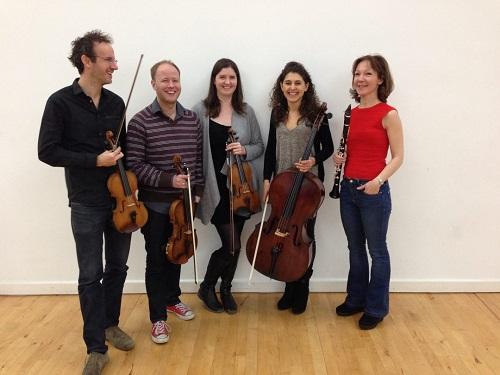There are those who say, somewhat cynically, that a way for new music to get an audience is to present it carefully packaged up with standard repertoire that will draw a larger crowd. How true that may be is open to debate, but composer Stephen Johnson did introduce his new piece – which was sandwiched between Brahms’s and Mozart’s clarinet quintets, as "the moment you’ve all been dreading".
The work – Angel’s Arc – is a beautiful, contemplative piece of music that explores sorrow, loss and gratitude from memories of Johnson’s own life. It is named after an area of the West Pennine Moors called Anglezarke, which Johnson had been erroneously led to believe had been given its title from Protestant refugees fleeing the Spanish Netherlands. The fact this turned out not to be true didn’t stop the idea of a people finding sanctuary and being thankful for this place from dwelling in the composer’s mind, and as he says himself in his programme note "many of the most useful poetic ideas have their origins in a mistake".
Angel's Arc is somewhat tonal, with melodies layered over one another. The cello plays a motif inspired by the psalmist’s line "I to the hills will lift mine eyes", while the clarinet plays a fragment – A G A B natural B natural A – which (sort of) spells the name of Johnson’s late cat Agatha (pictured below). Clarinettist Emma Johnson has a wonderfully soft yet strong sustained piano, and her dialogue with cellist Emma Denton towards the end of the piece was compelling right to the end.  Though the composer needn't have worried about the audience "dreading" his piece – if they did it didn’t show – his joke about premiering a piece in the winter time, when quiet passages could be interrupted by audience members’ seasonal ailments, was not unfounded. The whole concert was liberally seasoned with coughing, though that wasn’t the most annoying distraction. A faint though distinctly audible noise from a speaker, presumably from a steward who’d forgot to turn off a walkie-talkie, certainly stole some of the magic from Angel’s Arc’s closing bars.
Though the composer needn't have worried about the audience "dreading" his piece – if they did it didn’t show – his joke about premiering a piece in the winter time, when quiet passages could be interrupted by audience members’ seasonal ailments, was not unfounded. The whole concert was liberally seasoned with coughing, though that wasn’t the most annoying distraction. A faint though distinctly audible noise from a speaker, presumably from a steward who’d forgot to turn off a walkie-talkie, certainly stole some of the magic from Angel’s Arc’s closing bars.
The concert opened with Brahms’s Clarinet Quintet, composed towards the end of the composer's life. The Carducci Quartet gave a rich, velvety sound which was coupled with Emma Johnson’s gorgeous tone on the clarinet. She really is an incredible player. She raced through the range of the instrument with graceful and supple playing, and the balance between strings and wind was spot on. This was a warm and well-executed interpretation of this work, but it could have done with a bit more passion, more zest, to make it really engaging.
Emma Johnson once again exhibited faultless playing in the Mozart Clarinet Quintet, producing a sublime sound in the second, larghetto movement. The minuet had a rich and robust, though not over-heavy sound, with strong synergy between players. Though the Brahms may have been lacking in animation, the same was not true here, as all of Mozart’s expression in the piece shone through, sometimes sparkling and sometimes with a softer glow. Emma Denton brought out an array of vibrant hues in the cello, and leader Matthew Denton’s nimble violin playing lent to the music’s bright, springy feel.













Add comment